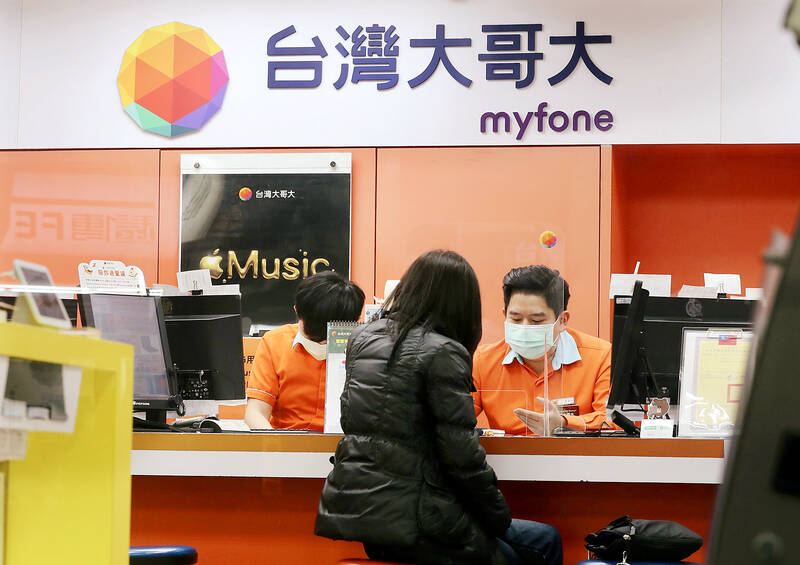Taiwan Mobile Co (台灣大哥大) said it is negotiating a lower acquisition bid for Taiwan Star Telecom Corp (台灣之星), as the regulator’s ruling last month curtailed Taiwan Mobile’s access to the 5G spectrum owned by Taiwan Star.
Taiwan Mobile seeks to slash about 72 percent of its offering to absorb financially strapped Taiwan Star through a share swap.
Taiwan Mobile’s board of directors yesterday approved an exchange of one Taiwan Star share per 0.0326 Taiwan Mobile shares, compared with 0.04508 shares agreed in December 2021, according to a company filing with the Taiwan Stock Exchange last night.

Photo: CNA
That proposal would significantly reduce the transaction to about NT$19.72 billion (US$647 million), based on Taiwan Mobile’s share price of NT$96.6, rather than NT$27.23 billion as calculated previously.
Taiwan Mobile said its board of directors met yesterday, but it declined to comment on the adjustment in the share swap ratio earlier yesterday.
“We are renegotiating for new terms,” Taiwan Mobile president Jamie Lin (林之晨) told an investors’ conference yesterday afternoon. “We hope we will have news to share very soon.”
Taiwan Mobile’s latest move came after the National Communications Commission gave conditional approval for the merger last month.
Taiwan Mobile is required to return 10 megahertz (MHz) of the 5G spectrum in the 1 gigahertz (GHz) band owned by Taiwan Star by June 30 next year for free, if it proceeds with the acquisition.
The commission’s decision is based on the Regulations for Administration of Mobile Broadband Businesses (行動寬頻業務管理規則), which set an upper limit of 5G spectrum acquisition of one-third — or 50MHz — of the total, or of the total auction spectrum of 150MHz.
Taiwan Mobile expects its revenue to grow this year, without counting the contribution from Taiwan Star, Lin said.
Revenue expanded 10 percent year-on-year to NT$172.21 billion, setting an all-time high, it said.
The telecom attributed the growth to a significant increase in monthly fees from 5G subscribers versus 4G users, and robust growth in its e-commerce and home broadband businesses.
Net profits were little changed, totaling NT$11.03 billion, increasing from NT$10.99 billion in 2021. Earnings per share increased slightly to NT$3.91 per share last year from NT$3.9 in 2021, it said.
Taiwan Mobile said it plans to boost capital spending this year to NT$12.8 billion, from NT$9.63 billion last year.
The increases are mainly due to the expansion of a logistics center for its e-commerce subsidiary Momo.com Inc (富邦媒體), it said.

NEW IDENTITY: Known for its software, India has expanded into hardware, with its semiconductor industry growing from US$38bn in 2023 to US$45bn to US$50bn India on Saturday inaugurated its first semiconductor assembly and test facility, a milestone in the government’s push to reduce dependence on foreign chipmakers and stake a claim in a sector dominated by China. Indian Prime Minister Narendra Modi opened US firm Micron Technology Inc’s semiconductor assembly, test and packaging unit in his home state of Gujarat, hailing the “dawn of a new era” for India’s technology ambitions. “When young Indians look back in the future, they will see this decade as the turning point in our tech future,” Modi told the event, which was broadcast on his YouTube channel. The plant would convert

‘SEISMIC SHIFT’: The researcher forecast there would be about 1.1 billion mobile shipments this year, down from 1.26 billion the prior year and erasing years of gains The global smartphone market is expected to contract 12.9 percent this year due to the unprecedented memorychip shortage, marking “a crisis like no other,” researcher International Data Corp (IDC) said. The new forecast, a dramatic revision down from earlier estimates, gives the latest accounting of the ongoing memory crunch that is affecting every corner of the electronics industry. The demand for advanced memory to power artificial intelligence (AI) tasks has drained global supply until well into next year and jeopardizes the business model of many smartphone makers. IDC forecast about 1.1 billion mobile shipments this year, down from 1.26 billion the prior

People stand in a Pokemon store in Tokyo on Thursday. One of the world highest-grossing franchises is celebrated its 30th anniversary yesterday.

Zimbabwe’s ban on raw lithium exports is forcing Chinese miners to rethink their strategy, speeding up plans to process the metal locally instead of shipping it to China’s vast rechargeable battery industry. The country is Africa’s largest lithium producer and has one of the world’s largest reserves, according to the US Geological Survey (USGS). Zimbabwe already banned the export of lithium ore in 2022 and last year announced it would halt exports of lithium concentrates from January next year. However, on Wednesday it imposed the ban with immediate effect, leaving unclear what the lithium mining sector would do in the